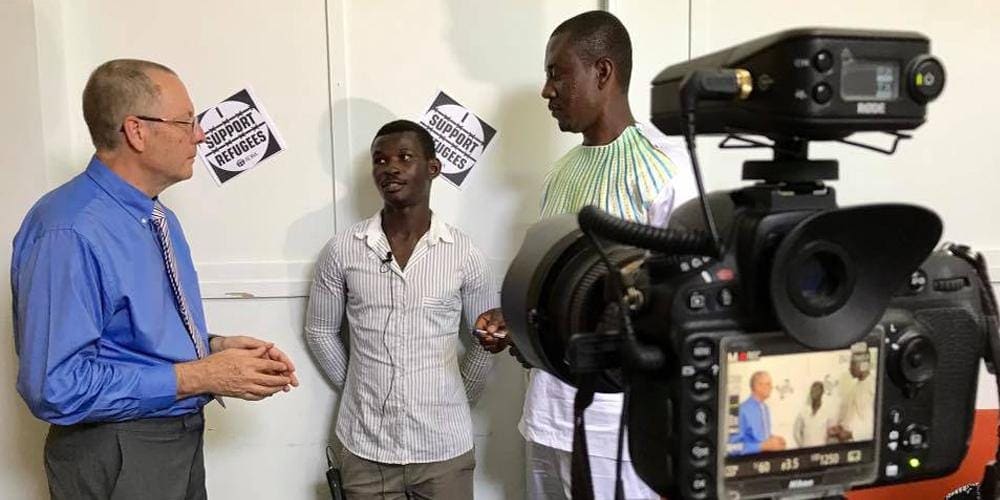
We live in a world of sad anniversaries. Seventy-five years ago this week, the D-Day landings of allied troops started the long haul across Europe to push back Hilter’s troops. It was 20 years ago last month that North Atlantic Treaty Organization (NATO) forces bombed the Chinese embassy in Belgrade during the Balkans Crisis, and 25 years ago that Rwanda was in the midst of 100 days of slaughter and genocide.
These histories still haunt us today.
As we remember the approximately one million Rwandans who were slaughtered by their neighbors and fellow citizens we ask, “How can such an outburst of undiluted evil ever be explained?” Like all evil, there is no real sense to be made of it, but the influence of theories about race and a certain view of “the other who is different” is alien to the principles we find in the biblical record.
![Trans-European Division communication director Victor Hulbert (left) interviews African refugees on World Refugee Sabbath 2017 in Castel Volturno, Italy. In 2019, this annual day of recognition will take place on June 15, 2019. [Photo: Inter-European and Trans-European Division News]](https://adventistreview.org/wp-content/uploads/2022/01/europe-to-host-world-refugee-sabbath-programs.jpg.jpg)
As a church, we have to wrestle with the fact that in 1994 there were many who claimed to be Christians — even some ordained to the gospel ministry and placed in leadership positions — whose actions were in stark opposition to the call of Christ. In at least one case, it is reported, a doctor slaughtered people seeking refuge in one of our hospitals.
How can we, as Christians, forget our humanity and that our brothers and sisters are also created in God’s image? Can we even call ourselves Christians if we forget that, as the apostle Paul wrote to the Galatians, “there is neither Jew nor Greek, there is neither bond nor free, there is neither male nor female; for ye are all one in Christ Jesus” (Gal. 3:28)?
Valuing Life
In the midst of horror too awful for the human mind to truly comprehend, some did remember the biblical teaching about equality and the value of human life. As we reflect on the tragic failure of humanity represented by genocide, let’s not forget to celebrate the heroism of the Muslim man and the native healer woman who famously saved many people from slaughter. There were many others as well.
Most well-known among Seventh-day Adventists is Carl Wilkens, the ADRA Rwanda country director who chose to stay in Rwanda and was the last American there as the slaughter proceeded. Without any human support to back him up, he confronted the leaders who orchestrated the genocide. God’s power working through him saved many lives.
Makasi-Courage
But it turns out that the Creator didn’t only have human heroes to call on during the genocide. The story of one of these other heroes is the subject of a short film being released in the lead-up to Creation Sabbath, an annual celebration established by the Seventh-day Adventist Church, which falls on October 26 this year.
The poignant story in the film Makasi-Courage is told by Janvier Nsimyimana, a genocide survivor and student at the Adventist International Institute of Advanced Studies (AIIAS) in the Philippines. The producer is another student, Samson Bush Maldonado, who recently graduated from AIIAS.
The film reveals that when humans forget their humanity, God can still use His creation to reveal His love.
World Refugee and Creation Sabbaths
On June 15, 2019, church leaders and members participate in World Refugee Sabbath, when they will remember thousands of people who have, as the Bible describes, “shown hospitality to strangers” (Heb. 13:2). Hospitality is the theme for 2019 as we focus on destination countries and tell stories of hope, healing, and acceptance among displaced people.
The story of Makasi-Courage is also a great reminder of our biblical origins and that we, as humans, were created in God’s image. This is a key reason why the Seventh-day Adventist Church has designated the fourth Sabbath in October each year as Creation Sabbath.
It is an important annual reminder because, when we forget that humans were created in God’s image (Gen. 1:26) and that each one of us is the subject of His infinite love, we are more likely to be tempted by the evil, dividing forces of this world — forces that lead to bigotry, racism, and even genocide.
I believe it is also the reason God wrote in stone that we should remember the Sabbath day to keep it holy (Ex. 20:8). By doing this we remember that He is our Creator and Redeemer and that each person from the least to the greatest is equal in His eyes. In Christ, there can be no genocide; genocide can only happen when we forget our Creator.
The original commentary was posted on the Trans-European Division news site.